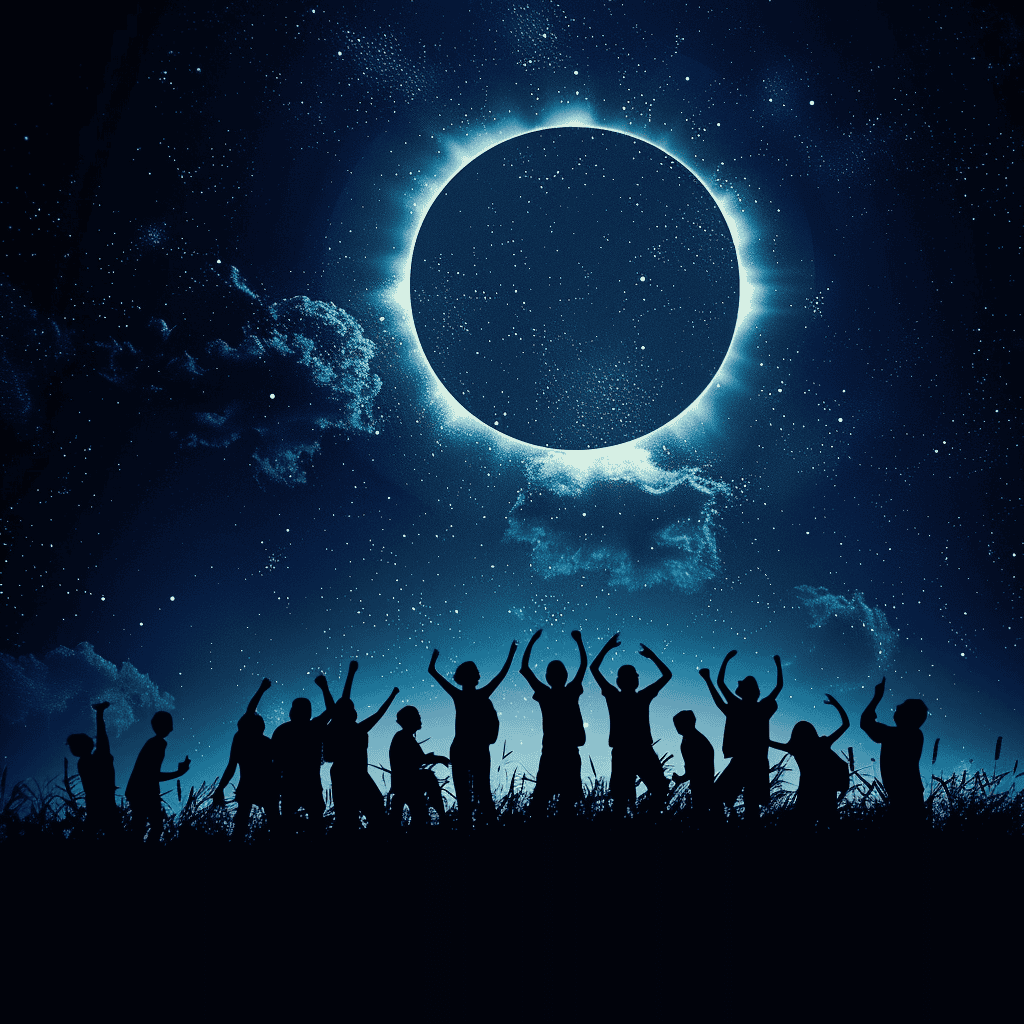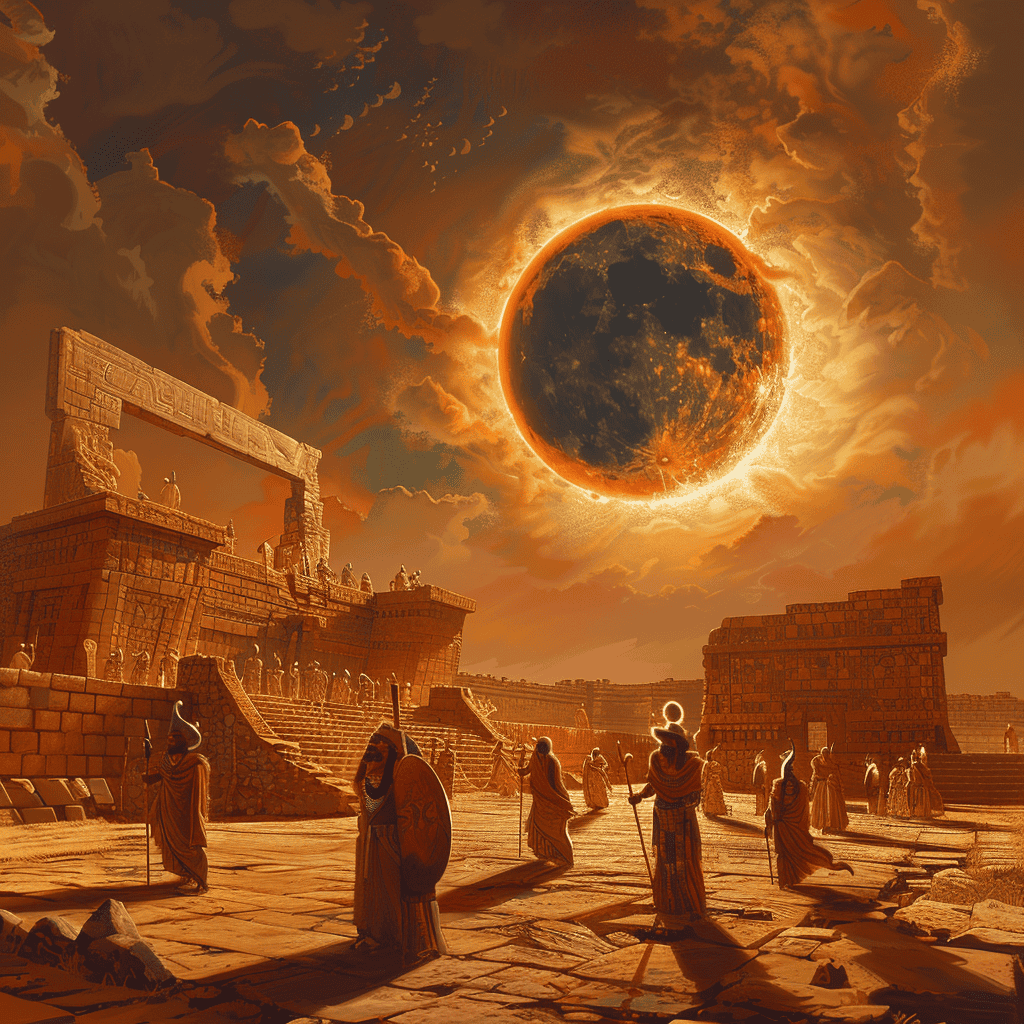Table of Contents
2024 Solar Eclipse: The Solar Eclipse of April 8, 2024, is set to be a significant celestial event, casting its shadow across a large portion of the Earth. This total solar eclipse will be visible across North America, with the path of totality stretching from Mexico through the United States and into Canada. The eclipse is expected to have a profound impact, not only on the regions directly under its path but also on the world as a whole.
For those fortunate enough to be within the path of totality, the eclipse will offer a unique opportunity to witness a remarkable phenomenon. Totality refers to the phase of the eclipse when the moon completely covers the sun, resulting in a dramatic darkening of the sky and revealing the sun’s outer atmosphere, known as the corona. This spectacle is a rare and awe-inspiring sight, attracting millions of people to the path of totality.
2024 Solar Eclipse: The Impact of the Solar Eclipse!

The global impact of the April 8, 2024, solar eclipse extends beyond the immediate viewing experience. It is expected to have a significant economic impact on the regions along the path of totality. With millions of visitors traveling to witness the event, local economies are likely to experience a considerable boost from tourism-related activities. Hotels, restaurants, and other businesses in these areas are preparing for an influx of visitors, leading to an estimated $1.5 billion injection into their economies.
Learn All About the Spirituality of Fairy Tales!
Moreover, the eclipse presents a valuable opportunity for scientific research. Scientists and researchers are planning to use the event to study various aspects of the sun, the Earth’s atmosphere, and the interactions between them. The eclipse offers a unique chance to study the sun’s corona, the solar wind, and other phenomena that are difficult to observe under normal circumstances.
2024 Solar Eclipse: Celebrating the Solar Eclipse!

To celebrate the Solar Eclipse of April 8, 2024, consider the following pointers:
- 2024 Solar Eclipse: Location: Be within the path of totality to experience the full eclipse. This path will cross Mexico, the U.S., and Canada. The closer you are to the centerline of the path, the longer totality will last.
- 2024 Solar Eclipse: Safety: Always use certified solar eclipse glasses to view the eclipse, except during the brief moment of totality when the moon completely blocks the sun.
- 2024 Solar Eclipse: Planning: Plan your trip in advance, considering potential traffic and the need for accommodations. Stay mobile if possible to adjust for weather conditions.
- 2024 Solar Eclipse: Weather: Check the weather forecast and plan accordingly. Open spaces or parks offer better views than city streets.
- 2024 Solar Eclipse: Equipment: Use solar eclipse glasses to look at the eclipse during the partial phase. A pinhole camera or colander can be used to project the image of the sun for a safe viewing experience.
- vMusic: Create an eclipse playlist to set the mood. Some suggested songs include “Anti-Hero” by Taylor Swift, “Black Hole Sun” by Soundgarden, and “Here Comes The Sun” by The Beatles.
- 2024 Solar Eclipse: Record Memories: Document your experience through writing, voice recording, or video. This can help you remember the event and share it with others.
- 2024 Solar Eclipse: Stay Informed: Follow the advice of local authorities and experts for the best viewing experience.
- 2024 Solar Eclipse: Enjoy the Moment: Take time to appreciate the unique spectacle of the eclipse. Remember to look around and take in the environment, as the world around you will be briefly transformed.
- 2024 Solar Eclipse: Post-Eclipse: After the event, take some time to reflect on your experience and share it with others. This can be a great way to connect with friends and family about the memorable event.
2024 Solar Eclipse: How the Solar Eclipse Impacts Each Astrological Sign!

The Solar Eclipse of April 8, 2024, is set to have significant impacts on each astrological sign in the zodiac, influencing various aspects of life including spiritual and emotional well-being. Here’s a breakdown of how each sign might be affected:
- Aries (March 21 to April 19): This eclipse is in Aries, which means Aries individuals might experience a significant personal transformation. It’s a time to embrace your true self and ignite your passions for a fresh start.
- Taurus (April 20 to May 20): The eclipse highlights your inner world, urging you to release old patterns and embrace emotional healing for personal growth.
- Gemini (May 21 to June 20): This eclipse could bring about changes in your social life and how you communicate. It’s a good time to reassess your relationships and communication styles.
- Cancer (June 21 to July 22): The eclipse might affect your career and public image. It’s a time to consider your professional goals and make necessary changes.
- Leo (July 23 to August 22): The eclipse could bring about spiritual growth and changes in your belief system. It’s a good time to explore new philosophies and expand your knowledge.
- Virgo (August 23 to September 22): This eclipse stimulates transformation in your intimate relationships, encouraging you to release old patterns and deepen emotional connections.
- Libra (September 23 to October 22): The eclipse energizes your partnerships, urging you to find balance and harmony in your relationships and embrace new beginnings.
- Scorpio (October 23 to November 21): The eclipse could bring changes and transformation in your daily routines and health habits. It’s a good time to focus on self-care and establish healthy routines.
- Sagittarius (November 22 to December 21): This eclipse activates your creativity and self-expression, encouraging you to pursue your passions and embrace your unique talents.
- Capricorn (December 22 to January 19): The eclipse affects your home and family life, urging you to create a nurturing environment and strengthen emotional bonds.
- Aquarius (January 20 to February 18): The eclipse could bring changes in your communication and learning styles. It’s a good time to explore new ways of expressing yourself and learning.
- Pisces (February 19 to March 20): The eclipse could bring about changes in your values and financial situation. It’s a good time to reassess your financial goals and make necessary adjustments.
These are general guidelines and the actual impact of the eclipse might vary depending on your astrological chart and current life circumstances.
2024 Solar Eclipse: Unveiling the Celestial Tapestry: How Different Cultures and Religions View and Celebrate a Solar Eclipse

As the moon passes between the sun and Earth, casting a shadow over our planet, the cosmic spectacle of a solar eclipse has captivated humanity for millennia. This awe-inspiring event has inspired a myriad of interpretations, rituals, and celebrations across different cultures and religions. From ancient civilizations to modern societies, the solar eclipse has been seen as a divine omen, a time of spiritual significance, and a celestial phenomenon to be revered and celebrated. In this article, we will explore the diverse ways in which various cultures and religions have viewed and celebrated solar eclipses throughout history.
Ancient Egypt and the Sun God Ra
Ancient Egyptians, who worshipped the sun god Ra, viewed solar eclipses as a time of great turmoil and fear. They believed that during a solar eclipse, the sun god was being attacked by the god of chaos, Apep. To protect Ra and restore order, the Egyptians would bang on drums and make loud noises to scare away Apep and ensure the sun’s safe return.
The Hindu Myth of Rahu and Ketu
In Hindu mythology, the demon Rahu attempts to steal the elixir of immortality from the gods. The sun and the moon alert Vishnu to this deception, and Vishnu decapitates the demon. The head becomes Rahu, and the body becomes Ketu. It is believed that during a solar eclipse, Rahu swallows the sun, only for it to emerge from the other side. To protect themselves from the demon’s wrath, Hindus perform special prayers and rituals during an eclipse.
The Navajo and the Time of Quiet Reflection
For the Navajo Nation, a solar eclipse is a sacred time to stay inside and quietly meditate. They believe that during an eclipse, the sun and the moon are in a state of renewal, and it is a time for introspection and spiritual growth. The Navajo refrain from eating, drinking, or engaging in any activity that could disrupt this sacred process.
Islamic Traditions and the End of Days
In Islamic tradition, some have interpreted solar eclipses as a sign of the “end times” or Judgment Day. The Prophet Muhammad’s son Ibrahim died on the day of a solar eclipse, and many of his followers at the time associated the celestial event with death and sorrow. However, Islamic scholars emphasize that eclipses are natural phenomena and should not be taken as divine omens.
The Eclipse Dragon in Ancient Mesopotamia and Medieval Islamic Art
In ancient Mesopotamia and medieval Islamic art, the motif of the eclipse dragon is often depicted as a stylized, knotted dragon. This image represents the celestial bodies’ movements and the eclipses that occur when the dragon swallows the sun and the moon. This artistic representation reflects the ancient understanding of eclipses and their significance in these cultures.
Modern Celebrations and Scientific Appreciation
In modern times, solar eclipses are celebrated not only for their spiritual and cultural significance but also for their scientific value. People gather in large groups to witness the event and participate in educational activities that highlight the astronomical and scientific aspects of the eclipse. For many, this is a time to appreciate the beauty and mystery of the cosmos and to foster a sense of unity and shared wonder among people from diverse backgrounds.
The solar eclipse has been a source of fascination and inspiration for countless cultures and religions throughout history. From ancient myths and legends to modern celebrations, this celestial event continues to captivate our collective imagination and inspire us to seek a deeper understanding of the universe and our place within it. As we look to the skies during the next solar eclipse, let us remember the rich tapestry of human experience that has been woven around this awe-inspiring cosmic event.
2024 Solar Eclipse: 20 Important Contemplations

- 2024 Solar Eclipse:A solar eclipse offers a unique opportunity to witness the celestial dance of the Sun, Moon, and Earth, aligning in a rare cosmic spectacle.
- 2024 Solar Eclipse:Observing a solar eclipse allows us to appreciate the vastness of our solar system and our place within it.
- 2024 Solar Eclipse:The event can inspire a sense of awe and wonder, fostering curiosity and interest in astronomy and science.
- 2024 Solar Eclipse:It provides an opportunity to learn about the different types of solar eclipses, including total, partial, and annular eclipses, and their unique characteristics.
- 2024 Solar Eclipse:Contemplating a solar eclipse can lead to a deeper understanding of the physical principles governing our universe, such as gravity and the motion of celestial bodies.
- 2024 Solar Eclipse:The event serves as a reminder of the intricate balance and harmony of our solar system, where the Moon’s orbit around Earth and Earth’s orbit around the Sun intersect in a precise alignment.
- 2024 Solar Eclipse:It can be a humbling experience, as it highlights the relative insignificance of human concerns in the grand scheme of the cosmos.
- 2024 Solar Eclipse:Observing a solar eclipse can foster a sense of global unity, as people from diverse backgrounds and cultures come together to witness the phenomenon.
- 2024 Solar Eclipse:It offers an opportunity for amateur astronomers and photographers to capture stunning images of the eclipse and the surrounding environment.
- 2024 Solar Eclipse:Contemplating a solar eclipse can lead to a greater appreciation of the natural world and the beauty of its phenomena.
- 2024 Solar Eclipse:The event can serve as a reminder of the historical significance of eclipses, which have been observed and studied by civilizations throughout history.
- 2024 Solar Eclipse:It can inspire discussions and explorations of the various myths, legends, and cultural interpretations surrounding solar eclipses.
- 2024 Solar Eclipse:Observing a solar eclipse can encourage a deeper understanding of the Earth’s atmosphere and its interactions with solar radiation.
- 2024 Solar Eclipse:The event provides a unique opportunity to study the Sun’s corona, which is only visible during a total solar eclipse.
- 2024 Solar Eclipse:It can serve as a catalyst for scientific research and discovery, as scientists use the eclipse to study various aspects of the Sun, Earth, and Moon.
- 2024 Solar Eclipse:Contemplating a solar eclipse can foster a sense of curiosity and a desire to learn more about the universe and its mysteries.
- 2024 Solar Eclipse:The event can inspire a sense of adventure, as people travel to the path of totality to experience the full effect of the eclipse.
- 2024 Solar Eclipse:It can serve as a reminder of the impermanence and transience of phenomena, as the eclipse passes in a relatively short amount of time.
- 2024 Solar Eclipse:Observing a solar eclipse can encourage reflection on the interconnectedness of all things, as the celestial alignment affects the Earth’s environment, wildlife, and human activities.
- 2024 Solar Eclipse:Finally, contemplating a solar eclipse can be a deeply personal experience, offering a moment of introspection and a chance to appreciate the beauty and complexity of the natural world.
2024 Solar Eclipse: Important Aspects of the Solar Eclipse!

For the Solar Eclipse on April 8, 2024, you can create a list that includes various important aspects and details about the event. Here’s a suggested list:
- Date and Time: The total solar eclipse will occur on April 8, 2024.
- Visibility: The eclipse will be visible in a narrow band stretching from Mexico, through the United States, and into Canada.
- Duration of Totality: The duration of totality will vary depending on the location, with some areas experiencing nearly five minutes of darkness during the event.
- Path of Totality: The path of totality will pass through Texas, Oklahoma, Arkansas, Missouri, Illinois, Kentucky, Indiana, Ohio, Pennsylvania, New York, Vermont, New Hampshire, and Maine in the United States.
- Safety Precautions: It is advised to wear solar viewing glasses, also known as “eclipse glasses,” to safely view the eclipse.
- Travel and Traffic: The eclipse is expected to bring a significant influx of tourists to the path of totality, so it is recommended to plan travel and accommodations in advance.
- Weather: The weather will play a crucial role in the visibility of the eclipse. Cities and towns along the path of totality in the U.S. may experience increased tourism due to the event.
- Air Traffic: Flights are not expected to be affected by the eclipse itself or the darkness, but the FAA anticipates an increase in air traffic levels.
- Animal Behavior: Pets and animals may behave differently during the eclipse, so it is suggested to take precautions and be aware of their reactions.
- Future Eclipses: This is the last total solar eclipse in the U.S. until the next one on Aug. 12, 2045, making it a rare and highly anticipated event.
In summary, the Solar Eclipse of April 8, 2024, is poised to have a significant impact on both the regions directly in its path and the world at large. It offers a unique opportunity for astronomical observation and scientific research, as well as a substantial economic benefit for the regions involved.
http://www.GreatHoroscopes.com

